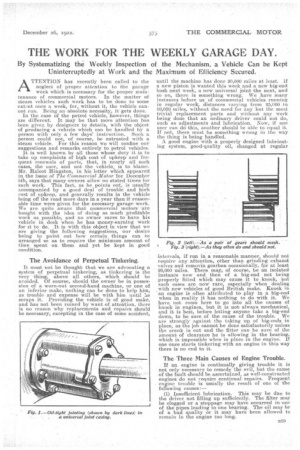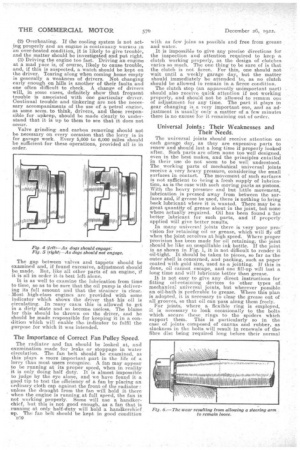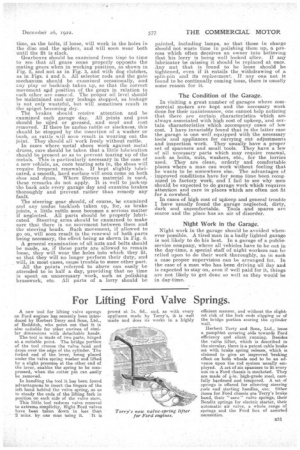THE WORK FOR THE WEEKLY GARAGE DAY.
Page 21

Page 22

Page 23

If you've noticed an error in this article please click here to report it so we can fix it.
By Systematizing the Weekly Inspection of the Mechanism, a Vehicle Can be Kept Uninterruptedly at Work and the Maximum of Efficiency Secured.
ATTENTION has recently been called to the neglect of proper attention to the garage work which is necessary for the proper maintenance of commercial motors. In the matter of steam vehicles such work has to he done to some extmt once a week, for, without it, the vehicle cannot run. Being an absolute necessity, it gets done.
In the case of the petrol vehicle, however, things are different. It may be that more attention has been given by designers to details, with the object of producing a vehicle which can be handled by a person with only a few days' instruction. Such a person could not, of course, be entrusted with a steam vehicle. For this reason we will confine our suggestions and remarks entirely to petrol vehicles.
it is well known by all those whose duty it is to take up complaints of high cost of upkeep and frequent renewals taf parts, that, in nearly all such cases, the user, and not the vehicle, is to blame. Mr. Halcot Hingston, in his letter which appeared in the issue of The Commercial Motor for December 5th, says that many owners allow no stated times for such work. This fact, as he points out, is usually accompanied by a good deal of trouble and high cost of upkeep, and generally results in the vehicle being off the road more days in a year than if reasonable time were given for the necessary garage :work. We are quite aware that commercial motors: are bought with the idea of doing as much profitable work as possible, and no owner cares to have his vehicle in dock when he has money-earning .Work for it to do. It is with this object in view that we are giving the following suggestions, our desire being to point out how certain things can be arranged so as to require the minimum amount of time spent on them and yet be kept in good condition. •
The Avoidance of Perpetual Tinkering.
It must not be thought that we are advocating a system of perpetual tinkering, as tinkering is the very thing, above all others, which should he avoided. Of course, should the owner be in possession of a worn-out second-hand machine, or one of an inferior make, nothing can be done to help him, as trouble and expense will be with him until he scraps it. Providing the vehicle is of good make, and has not been ruined by want of attention, there is no reason why replacements and repairs should be necessary, excepting in the case of some accident,
until the. machine has done 20,000 miles at least.. If a new piston is wanted this week and a new big-end bush next week, a new universal ioint the next, and iô on, there is something wrong. We have many instances before us of commercial vehicles running in regular work, distances varying from 25,000 . to 510,00() miles, without the need for any but the most trivial replacement parts and without any work being done that an ordinary driver could not do, such as adjustments and lubrication. Now, if one user can do this, another should be able to equal it. If not, there must be something wrong in the way the thing is being handled.
A good engine with a properly designed lubricating system, good-quality oil, changed at regular intervals, if run in a reasonable manner, should not require any attention, other than grinding exhaust valves and removin gcarbon occasionally, for at least 20,000 miles. There may, of course, be an isolated instanoe now and then of a big-end not being properly fitted which may cause it to knock, but such cases are now rare, especially when dealing with new vehicles of good British make. Knock in an engine is often attributed to play in a big-end when in reality it has nothing to do with it. We have not room here to go into all the causes of knock in engines, but it is not always mechanical, and it is best, before letting anyone take a big-end down, to be sure of the cause of the trouble. We are strongly against the taking up of big-ends in place, as the job cannot be done satisfactorily unless tbe crank is out and the fitter can be sure of the itmotint of clearance he is allowing in the bearing, which is impossible when in place in the engine. If one once starts tinkering with an engine in this way there is no end to it.
The Three Main Causes of Engine Trouble.
If an engine is continually, giving trouble it is not only necessary to remedy the evil, but the cause of the fault should be ascertained, as well-constructed engines do not require continual repairs. Frequent engine treuble is usually the result of one of the following causes
(1) Insufficient lubrication. This may be due to the driver not filling up sufficiently. The filter may be clogged or a stoppage may have occurred in .one of the pipes lea4ing to one bearing. The oil may be of a bad quality or it may have been allowed to remain in the engine too long. (2) Overheating. If the cooling system is not acting properly and an engine is continually worsen in an over-heated condition, it is likely to give trouble, and the matter should be investigated and put right. (3) Driving the engine too fast. Driving an engine at a mad pace is, of course, likely to cause trouble, and, if this is suspected, a watch should be kept on the driver. Tearing along when coming home empty is generally a weakness of drivers. Not changing early enough on hills is another of their faults and one often difficult to check. A change of drivers will, in some cases, definitely show that frequent trouble is associated with one Particular driver. Continual trouble and tinkering are not the necessary accompaniments of the use of a petrol engine, as some seem.. to think, drivers, and those responsible for. upkeep, should be made clearly to understand that it is up to them to see that it does not occur.
Valve grinding .and carbon removing should not be necessary on every occasion that the lorry is in for garage work. Every 5,000 to 6,000 miles should be sufficient for these operations, provided all is in order.
The gap between valves and tappets should be examined and, if found excessive, adjustment should be made. But, like all other parts of an engine, if it is all in order it -is best left alone.
It is as well to examine the lubrication from time to time, so as to be sure that the oil pump is delivering its full amount and that the strainer is clear. Most high-class engines are provided with some indicator which shows the driver that his oil is circulating. In :many caSes this is allowed to get in a dirty state and so become useless. The blame for this should be thrown on the driver, and he should be made responsible for keeping it in a condition which will enable the indicator to fulfil the purpose for which it was intended.
The Importance of Correct Fan Pulley Speed.
The radiator and fan should be look-ecl at, and examination made for leaks 01 stoppage in water circulation, The fan belt should be examined, as this plays a more important part in the life of a lorry than most users recognize. A fan may appear to be running at its proper speed, when in reality it is only doing half duty. It is almost impossible to judge by the eye alone, and we have found it a good tip to test the efficiency of a fan by placing an ordinary cloth cap against the front of the radiator : unless the draught from the fan will hold it there when the engine is running, at full speed; the fan is not working properly. Some will use a handkerchief, but this is not good enough, as a fan that is running at only half-duty will hold a handkerchief up. The fan belt should be kept in good condition
n90 with as few joins as possible and free from grease and water.
It is impossible to give any precise directions for the inspection and attention required to keep a clutch working properly, as the design of clutches varies so much. The one thing to be sure of is that the clutch is not fierce. For this, one should not wait until a weekly garage day, but the matter should immediately be attended 'to, as no clutch should be allowed to remain in a fierce condition.
The clutch stop (an apparently unimportant part) should also receive quick attention if not working properly, and should not be allowed to remain OU6 of adjustment for any time. The part it plays in gear changing is a very important one, and as adjustment is usually only a matter of a few minutes there is no excuse for it remaining out of order.
Universal Joints: Their Weaknesses and Their Needs.
The universal joints should receive attention on each garage day, as they are expensive parts to renew and should last a long time if properly looked after. Such parts are often none too well designed, even in the best makes, and the principles entailed in their use do not seem to be well understood. The working parts of mechanical universal joints receive a very heavy pressure, considering the small surfaces in contact. The movement of such surfaces is not sufficient to bring a fresh supply of lubrication, as is the case with such moving parts as pistons. With the heavy pressure and but little movement, lubrication is pressed away from between the surfaces and, if grease be used, there is nothing to bring back lubricant where it is wanted. There may be a great quantity of grease about in the joint, but-none where actually required_ Oil has been found a'far better lubricant forsuch. parts, and if, properly applied will give better results.
In many universal joints there is very poor provision for retaining oil or grease, which will fly off when the joint revolves at high speed. Where proper provision has been made for oil retaining; the joint should be like an unspillable ink bottle. If the joint is as shown in Fig. 1, it is not difficult to render itoil-tight. It should be taken to pieces, so far as the outer shell is concerned, and packing, such as paper coated with gold size, used as a jointing. If this is done, oil cannot escape, and one fill-up will last a long time and will lubricate better than grease.
It is not easy to give any direct instructions for fitting oil-retaining devices to other types of mechanical universal joints, but wherever possible an oil-bath is preferable to grease. Where this plan is adopted, it is necessary to clear the grease out of all grooves, so that oil can pass along them freely. For joints, where a flexible ring is employed, it is necessary to look occasionally to the bolts which secure these rings to the spiders which support them. This is particularly so in the ease of joints composed of canvas and rubber, as slackness in the bolts will result in renewals of the fibre disc being required long before their normal time, as the bolts, if loose, will work in the holes in the disc and the spiders, and will soon wear both until the fit is slack.
Gearboxes should be examined from time to time to see that all gears come properly opposite the mating gears when in working position, as shown in Fig. 2, and not as in Fig. 3, and with dog clutches, as in Figs. 4 and 5. All selector rods and the gate mechanism should be examined occasionally, and any play or backlash taken up, so that the correct movement ad position of the gears in relation to each other are assured. The proper oil level should be maintained and any leakage stopped, as leakage is not only wasteful, but will sometimes result in the spigot becoming dry. The brakes should receive attention and be examined each garage day. All joints and pins should be oiled or greased, and mud and rust removed.. If there be undue rattle or slackness, this should be stopped by the insertion of a washer or bush, as rattle will soon result in wearing out the joint. They should all work freely without rattle. In cases where metal shoes work against metal drums, care should be taken that a little lubrication should be present so as to prevent tearing up of the metals. This is particularly necessary in the case of a new vehicle, as, one tearing sets in, the shoes will require frequent renewals. If kept slightly lubricated, a smooth, hard surface will soon come on both shoe and drum. Where fibrous material is used, these remarks do not apply. It is well to jack-up the back axle every garage day and examine brakes thoroughly and prevent rather than remedy any fault.
The steering gear should, of course, he examined and any undue backlash taken up, for, as brake joints, a little rattle. soon becomes a serious matter if neglected. All parts should be properly lubricated. Steering arms should be examined to make sure that there is no movement between them and the steering heads. Such movement, if allowed to go on, will soon result in the renewal of both parts being necessary, the effect 'being as shown in Fig. 6. A general examination of all nuts and bolts should be made' as, if these parts are allowed to remain
' loose they will wear the holes into which they fit, so that they will no longer perform their duty, and will, in most cases, eau,se trouble to some other part. All the points referred to above can easily be attended to in half a day, providing that no time is spent on unnecessary work, such as polishing brasswork, etc. All parts of a lorry should be painted, including lamps, so that those in charge should not waste time in polishing them up, a process which often deceives an owner into believing that his lorry is being well looked after. If any lubricator be missing it should be replaced at once. Any nut that is found to be loose should be tightened, even if it entails the withdrawing of a split-pin and its replacement. If any one nut is found to be continually coming loose, there is usually some reason for it.
The Condition of the Garage.
In visiting a great number of garages where commercial motors are kept and the necessary work done for their maintenance, one cannot help noticing that there are certain characteristics which are always associated with high cost of upkeep, and certain characteristics which accompany cases of law cost. I have invariably found that in the latter case the garage is one well equipped with the necessary tools and appliances for carrying out adjustments and inspection work. They usually have a proper set of spanners and small tools. They have a few of all necessary parts which may require renewal, such as bolts, nuts, washers, etc., for the lorries used. They are clean, orderly and comfortable places where a man can work without feeling that he wants to be somewhere else. The advantages of improved conditions have for some time been recognized in factory work, and I fail to see why men should be expected to do garage work which requires attention and care in places which are often not fit for a cowshed.
In cases of high cost of upkeep and general trouble I have usually found the garage neglected, dirty, dark and uncomfortable. Tools and spares are scarce and the place has an air of disorder.
Night Work in the Garage.
Night work in the garage should be avoided whenever possible. A tired man in a badly lighted garage is not likely to do his best. In a garage of a publicservice company, where all vehicles have to be out in the day-time, a special stall of night workers can be relied upon to do their work thoroughly, as in such a case proper supervision can be arranged for. In the case of a man who has been driving all day and is expected to stay on, even if well paid for it, things are not likely to get done so well as they would be in clay-time.






























